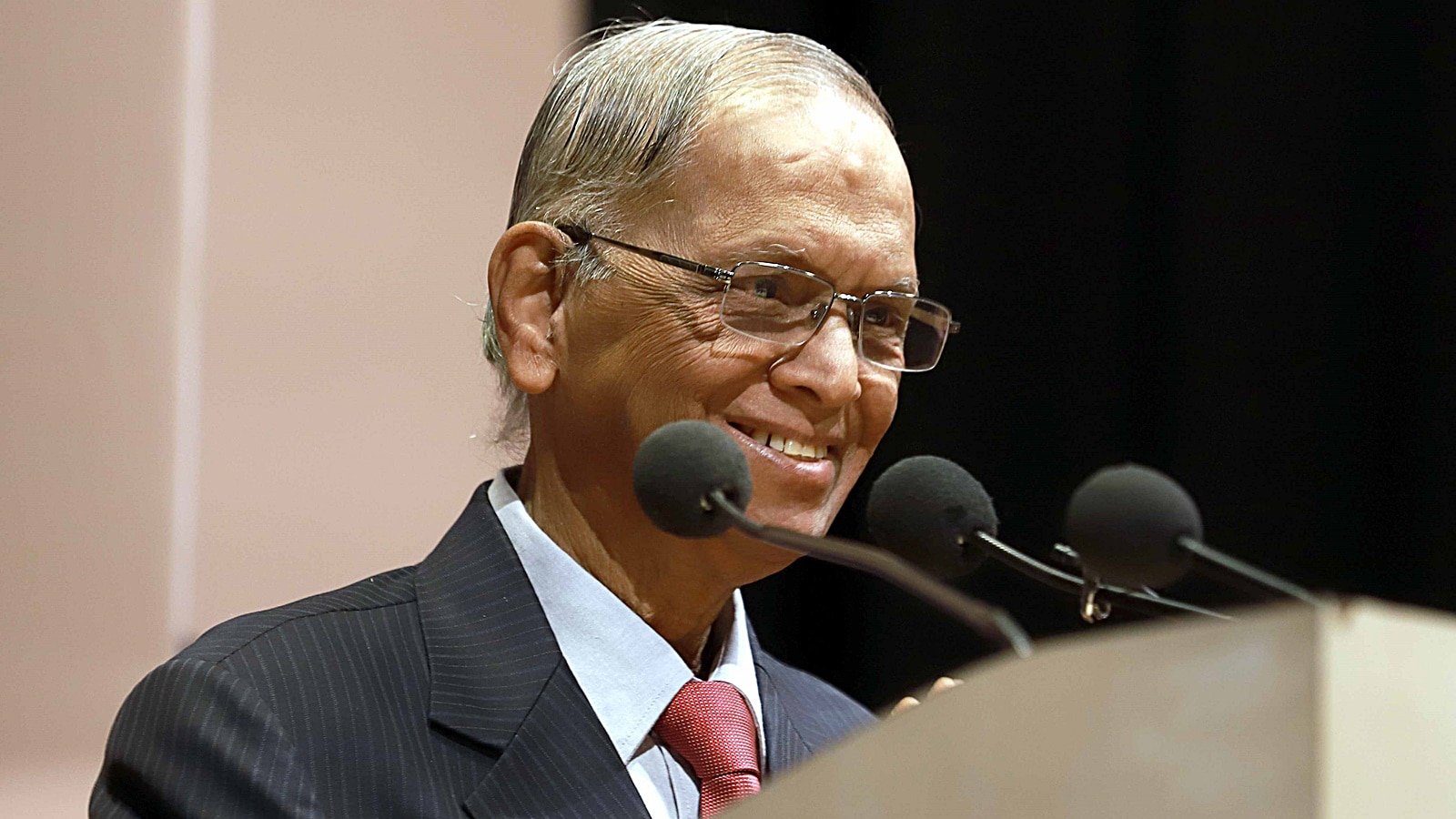[ad_1]
There’s a meme that never fails to provide wry cheer on bad days at work: A woman trying to keep her head above water, quite literally, while the accompanying text reads, “What it feels like trying to excel in my career, raise children, text people back, drink enough water and exercise.”
It’s one that is unlikely to appeal to Narayana Murthy, whose recent advice to young IT professionals on a podcast was to work 70 hours a week to address India’s low productivity concerns and to meet the demands of momentous global changes in the coming decades. “Our culture has to change to that of highly determined, extremely disciplined and extremely hardworking people. That transformation has to come to youngsters because youngsters form a significant majority of our population at this point of time. They are the ones who can build our country, you know, with gusto,” he said on the inaugural episode of 3one4 Capital’s podcast ‘The Record’.
Three years ago, Murthy had made a similar suggestion to revive the Indian economy by asking young people to work 60 hours a week. Women — single, married, young or middle-aged — are the least likely to survive in the demographic that the Infosys founder is exhorting to greater action, but we will come to that later.
Murthy is right on many counts: Nation building is hard work and it requires discipline and determination. But a nation built on the labours of a work force struggling with high stress, low income and lower work-life balance makes for a precarious foundation. An International Labour Organisation report titled ‘Working Time and Work-Life Balance Around the World’, released in January this year and relying on data from just before the pandemic, found that people in South and East Asia have the highest average in weekly work hours. While the South Asian average was pegged at 49 hours per week for individual workers, the East Asian average was 48.8 hours. In contrast, North America registered 37.9 average working hours in a week and northern, southern and western Europe clocked 37.2 average working hours per week.
In developing nations, the metric of productivity places a premium on an employee’s availability over the value of his contribution. It encourages a culture of FOMO, where presence is a validation of sincerity and intent. So while developed nations such as Belgium, France and Germany (whose post World War II example Murthy evokes in his appeal) are experimenting with shorter weekly work hours, most Asian countries, including India, equate flexi-time or an employee’s need for work-life balance as a sign of lower commitment — even competence. Irrespective of the toll it takes on mental health, family life or simply one’s ability to engage, the message is clear: Shape up or ship out.
In a country where party members set up the Prime Minister as a benchmark for dedication for working 22 hours, this valorising of time spent at the workplace automatically tilts the balance away from the female workforce. A 24/7 work culture thrives on the assumption of a supervisory infrastructure to take care of all other aspects of an employee’s life, freeing him or her up to devote himself to work. It works surprisingly well for men. The packed lunches that accompany them to the workplace, the missed PTMs that can be explained away by their irreplaceability in the office, the doctors’ appointments where they don’t have to accompany elderly family members are concessions often unavailable to even the privileged among their female counterparts. It allows for unrealistic standards of professionalism, where female employees end up playing catch-up. Those who match steps learn to speak the “language of men”.
Most Read
For women, more often than not, there is little to no untethered time. If you are young and new to the workforce, it could be the disproportionate responsibility of menial tasks that come your way on the assumption that you have less of other commitments; if you are older, the cycle of chores between home and the workplace press down upon you in a relentless loop of fatigue, guilt and anxiety.
Yet, if there’s anything that the two years of Covid-19 have shown, it is that that the workplace and the way one works have changed irreversibly. That though work necessitates structure and discipline, it is entirely possible to harness the potential of individual employees in better, more balanced, and mutually equitable ways. It requires practical expectations of each other and the creation, not the assumption, of a support mechanism for men and women. In her book, My Life in Full: Work, Family and our Future (2020), former PepsiCo CEO Indra Nooyi made a case for job flexibility and remote work, “for everyone who needs it.” She writes, “This will give families the chance to take care of home life obligations during the workday without feeling loaded with emotional consequences.’’
Now, more than ever before, work cannot be a one-way street, turning its back on everything else in its focus on future accomplishments. There are lives to be lived, relationships to be nurtured, dreams to be chased. It’s a memo lost on people like Murthy, whose own exceptional success predicates a singular, unvarying belief in how it must be approached. Nation building requires hard work, discipline and determination. But it also necessarily requires an ability to move with the times.
Let me drink some work water to that.
paromita.chakrabarti@expressindia.com
[ad_2]







